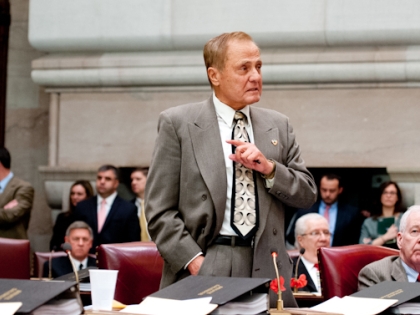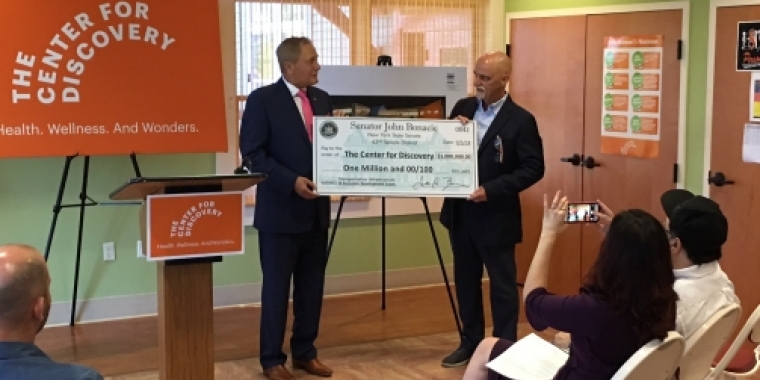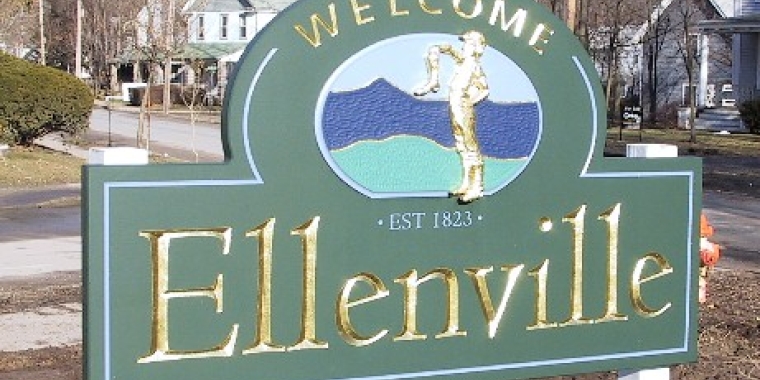
Bonacic Testifies At Epa And Dept. Of Health Hearing On Watershed Agreement

State Senator John J. Bonacic (R-C-I - Mt. Hope), testified at a joint hearing of the United States Environmental Protection Agency (EPA) and NYS Department of Health (DOH) in relation to the continuance of the Filtration Avoidance Determination.
The EPA and DOH are jointly taking comments on the concerns of the watershed region as they consider whether or not the City should be required to filter its water supply system. The water supply system is able to remain unfiltered only with EPA permission.
Over 100 area residents from Ulster and Delaware Counties attended the hearing. The prepared text of Senator Bonacic's remarks is below:
JOHN J. BONACIC
State Senator
Room 815, Legislative Office Building
Albany, NY 12247
(518) 455-3181
INTRODUCTION
As the elected official who represents more of the New York City watershed than anyone else, I welcome the EPA and DOH's coming to the Catskills to hear our observations and concerns.
Put simply, it is my position the EPA should not renew the filtration avoidance determination without significant changes in the substance of the agreement and how the DEP does business.
The watershed agreement, despite the best intentions, has not been the success our region was promised.
In the past thirteen months, the New York State Senate has had to pass four separate pieces of legislation which are necessary to correct how the City of New York treats the watershed region. I will detail those bills in a moment.
The Watershed Agreement, is nothing more than a contract. Every contract presumes the good faith of all parties. With the DEP, at least until Commissioner Lloyd, I have seen a lot of good words, but absolutely no good faith.
Commissioner Lloyd has breathed some hope into the watershed agreement. Like former Commissioner Marilyn Gelber, Commissioner Lloyd returns most phone calls, keeps her word, and has honest, if not satisfactory answers to questions posed by watershed officials.
THE ISSUES
Until these issues are addressed to the satisfaction of the watershed communities, the FAD should not be renewed for anything more than a period of a few months. The issues I am about to detail will take years to address, but the groundwork can be laid now.
Flood Control
On April 2, 2005, massive flooding across my Senate District, destroying property, and taking lives. The damages from those floods were exacerbated by the City of New York’s unwillingness to undertake flood control.
The firefighters in Downsville, whom I stood with, just after the floods, told me of waves cresting 13 feet above the Pepacton. My grandson knows that before you hop in a tub full of water, you’d better drain some out, or there will be flooding on the bathroom floor. Yet the DEP, on April 2, let that massive rainfall come, and their method of draining the reservoirs was to flood my constituents.
They accept no blame for this. Their answer to the working families flooded out – sue us. Sue the City of New York? Their answer is to tell my constituents, who average $28,000 a year for a family of four in parts of the devastated area to go hire lawyers and sue them. How dare they.
Bad things happen. When they do, and when they are caused by government, government has two obligations. First, make it right. Second, make sure it doesn’t happen again. Government’s obligation is not to tell its citizens to sue.
I would like to tell the EPA that the flood was a surprise. That the DEP never contemplated the flood, that it was a once in a lifetime occurrence. That would not be true.
In fact, flooding was expressly contemplated by the DEP. Not by some low level bureaucrat, but by the Commissioner. In January of 2005, less than 90 days before the flood, but still plenty of time to take action, this is what the DEP Commissioner, Chris Ward said:
"Residents must remember that Pepacton was not designed as a flood control reservoir." (unquote) and "communities downstream should still take steps to
improve their flood preparedness and to closely examine their uses of the downstream flood plain."
Those words were not off the cuff remarks, taken out of context to one of the reporters the DEP spokesman would later call an ignoramus. Those words of Commissioner Ward were straight from a DEP press release
Loosely translated, Commissioner Ward was saying, "I don’t care how long you’ve lived in your home or owned your land, we’ve created a hazard here in the Pepacton Reservoir, so watch out you locals".
My response to Commissioner Ward was that big agencies must remember that humans were not designed as flood victims and multi-billion dollar government agencies should take steps to improve their reservoirs and closely examine their construction to ensure they don’t destroy property and lives.
After the 2005 floods, I successfully moved a bill to the Senate floor which would have taken away the City’s ability to regulate its reservoir levels. It was a bill that should not have been necessary because common sense says that the City should have intelligently managed those reservoirs without me trying to force their hand legislatively.
As Chairman of the Senate Housing Committee, I also withheld my support for certain housing related issues the City needed in an effort to win concessions from the City on certain watershed related issues.
Then on February 13th of this year, with overwhelming bi-partisan support, and overwhelming support from New York City Senators, the Senate passed legislation actually taking away the City’s authority to manage its reservoir system.
Coincidence or not, a month later, the New York Times announced that "In major shift in the way New York manages its vast upstate water supply system, the Bloomberg administration announced several measures on Monday which would put the city firmly in the flood control business, assuming a responsibility it has long tried to avoid." – NY Times, March 14, 2006.
It should never have taken my passing legislation; it should never have taken the cries from our local officials; it should never have taken the loss of property; it should never have taken the loss of life to put the City in the flood control business.
I have said it before – if you are in the water supply business, you are in the flood control business, and its nice that my friends in the DEP finally know that.
We are not done though.
The fact that the City has created a waste channel off the Ashokan; the fact that the City has implemented rain and snow based draw downs on a few of their reservoirs are good. What the City should be ordered to do on all their reservoirs, is what they are now doing, in a crisis mode, at the Schoharie – put in permanent flood control mechanisms.
When my flood control bill was being debated on the Senate floor, a New York City Senator asked me wouldn’t the flooding occur anyway? She is apparently unaware that New York City diverts billions of gallons through man made tunnels into the Esopus Creek, a creek which lies a few hundred yards from where we stand today, and that that diversion has caused massive flooding in towns in Ulster County.
It should not take an act of the New York State Senate, area and international media, and a Federal Judge, to get the DEP to act. The power the EPA has is the only power I believe the DEP fears – the power to revoke the FAD and make them do what they don’t ever want to do.
That is why it is critically important that as part of any FAD extension, the EPA advises, urges, and most important ORDERS, the DEP to implement and maintain flood control mechanisms in each of its reservoirs. Not a single other constitutent of mine should have their property or destroyed or life lost because of the DEP's failure to implement flood control.
Dam Safety
The next issue I want to detail is dam safety.
In January of this year, the Times Herald Record broke the news that a dam inspector for the DEP was submitting photocopied dam inspection reports.
That news broke after the fall, 2005 admission by the DEP that the Gilboa dam may not meet the necessary standards. As a result of the Gilboa’s problems, billions of gallons have been dumped into Ulster County, just a short distance from where we stand. That crisis has created a panicked draw down of a reservoir which holds 17 billion gallons of water – and is, by far, the smallest of the West of Hudson Reservoirs.
The good news, was that the Schoharie Reservoir was able to be diverted through the Shandaken tunnel more rapidly that some of the other reservoirs. The bad news is, that diversion increased the volume of the Esopus, and put my constituents at risk.
The scary part, is that the Schoharie is only 1/8 of the Pepacton – the reservoir with the 13 foot waves.
Dam safety, like flood control, is not an option.
As a result of that dam safety scandal, the Legislature has passed various bills requiring local officials be provided with basic dam safety information and the Senate has passed comprehensive legislation requiring the DEP to detail their maintenance plans and what they have actually done.
The DEC Commissioner has also had to formally ask for those plans from the DEP. The EPA, as part of any FAD extension, should require the DEP to provide to the EPA and the DEC its ongoing dam maintenance plan and tell the DEC and the EPA what parts of those plans have and have not been accomplished. Those documents should be treated as public documents because the public has the right to know if the dams are safe.
The Senate has unanimously passed legislation I have sponsored on this issue and I urge the EPA to condition the FAD’s continuance, if granted at all, on ensuring the safety of the DEP dams.
Coalition of Watershed Towns
The Coalition of Watershed Towns was developed by my predecessor, Senator Charles Cook, in the early 90’s to oppose the City’s efforts to expand regulation of the watershed.
The Coalition has no professional staff and is made up of part-time local officials –hard working New Yorkers who typically work other jobs during the day and serve their communities at night by serving as Town Supervisor or Councilmember.
How do I know – three of my staff are current or former elected officials from within the waershed, who have had to take time off to meet with the DEP, debate one thing or another, and not get issues resolved. If this is how my staff is treated, I can only imagine what happens to part-time officials who aren’t on a first name basis with senior DEP staff.
My belief is that the CWC is a good organization, but it is not an advocacy based organization; it is an administrative agency. The DEP is an advocacy based agency. Staffed by lawyers and engineers, they negotiate with part time Supervisors and Councilmembers who have other jobs and other responsibilities.
If a big developer comes into town and proposes something, that developer must pay local officials the dollars those officials need to hire experts to review projects. In the case of the watershed, the big developer is the City of New York. The City wants to negotiate everything from sewer systems to land purchases to sporting regulations with part time officials who have to take time off from their main job, to come and talk with people who more often than not, can't make a decision. The Coalition of Watershed Towns has neither the resources nor the expertise to independently analyze what the DEP is proposing – except by raising local property taxes to pay for them.
The EPA should order equity be created by directing the DEP to fund the Coalition of Watershed Towns – just as a developer has to pay local engineering and legal fees, when the developer is negotiating with the Town. Here the negotiations might not consist of development, but they require time and expertise and are being built solely because of the City’s need for our region’s water.
The Coalition should have a professional staff of people, funded by the DEP, to review the DEP’s initiatives and make recommendations to local officials as to the merit of the DEP’s position and what they are proposing.
Recreational Uses
The watershed agreement requires the DEP follow the historic recreational uses of the Catskills. Simply put, that has not happened. Commissioner Lloyd called me recently to tell me the DEP would be expanding fourteen pilot programs for recreational uses.
That’s nice, but I can’t say "thank you" to her. We shouldn’t have to fight for something the watershed agreement expressly promised. By causing our local and State officials to have to spend hours and dollars to obtain what was promised in the watershed agreement, the DEP intends to wear us down. They will not succeed, but they should not be permitted to even try.
The State has had a partnership with the people of the Catskills for over 100 years. Here at Belleayre, we are sitting at a premier example of that partnership. Outdoor recreation is a tourism draw and an economic necessity in this part of the State. The DEP is hindering that.
I should not have to dedicate one moment of my time to passing legislation to force the DEP to keep a promise they made a decade ago. They've found time to buy the land, they should be ordered to find the time to make that land accessible. My constituents should be able to go to their Town Clerk, obtain a recreational permit and use that permit for any type of recreational use that is allowed on State owned lands, other than those uses which might legitimately risk the security of the water supply system.
You have the power to remedy this serious problem, and I urge you to use that power now.
DEP AND CITY SENIOR MANAGEMENT SHOULD COME TO OUR REGION
I started off saying Commissioner Lloyd is better than her predecessors at keeping her word, and she is. I know she has circumstances which do not allow her to be here tonight, and I respect that. As someone with diverse responsibilities, I cannot be everywhere all the time and appreciate the fact that she can’t either.
Several months ago, during the time when flood risks were significant, I invited Commissioner Lloyd to come to Delaware and Ulster Counties and participate in public forums to discuss what the DEP could and would do - to stand before the people who live around the reservoirs she controls and tell them what she is doing to ensure their safety.
In early March, she sent her Deputy and her Engineer to speak to the elected leaders of Delaware County.
People want and deserve accountability in government. The DEP Deputy Commissioner and staff may be nice people, but the buck stops with the Commissioner and Mayor.
Commissioner Lloyd and Mayor Bloomberg should not hesitate to come stand here if they think they are treating the people of this region fairly. Mayor Bloomberg came to Sullivan County last year – campaigning for the votes of City residents on vacation. He helicoptered in and out and probably never saw so much as a reservoir much less the flooded out areas beneath it.
Accountability exists when the people made to account, stand before the public and say what they stand for. Commissioner Lloyd should stop sending her deputies, assistant deputies, engineers, lawyers, etc. to these major public forums and come stand here.
100 years ago, the City literally flooded out parts of our region to build reservoirs. Now, in Delaware, Sullivan, and Orange Counties, there is an effort to string unsightly and massive power lines across our region for the City's power needs. Our region is not simply a conduit for the City’s water and power needs. We are communities in our own right and those that seek to regulate us ought to have the decency to come here, look our citizens in the eye and talk to them about their agency's plans.
No amount of staff can relate to a Commissioner and Mayor the genuine fear my constituents felt after last year’s floods. You only get it if you are standing on the ground, looking up, talking to people who have live here, hearing brave firefighters describe their concerns for their community, hearing seniors who have lived here for decades say they’ve never seen it worse.
It should not take me holding the City’s rent control laws up in my capacity as Chairman of the Housing Committee to get the DEP to respond. It should not take a NY Times expose', or a Federal Judge to order the DEP be monitored – as has happened twice now.
Government exists for the people, and the leaders of government agencies which effect the people ought to stand before them and say what’s on their mind.
Other Issues
There are a handful of other issues that local officials have raised and I want to echo them. I believe that the Delaware County Action Plan must be funded as part of any FAD extension. I believe there should be a moratorium on all future DEP land purchases until such time as the recreational issues are worked out and the Coalition of Watershed Towns votes to support new land purchases. I believe that the storm water permit process must be simplified as has been or will be detailed by Delaware County’s submission, and I believe that we must ensure the funding is in place for wastewater treatment plants so that service for all connected properties, including commercial properties, is minimal and affordable.
CONCLUSION
I appreciate the EPA’s and DOH's willingness to come here. Our region is a wonderful region to live in. With the DEP’s cooperation, we can take the promise of the watershed agreement and make it into a reality.
Thank you.


